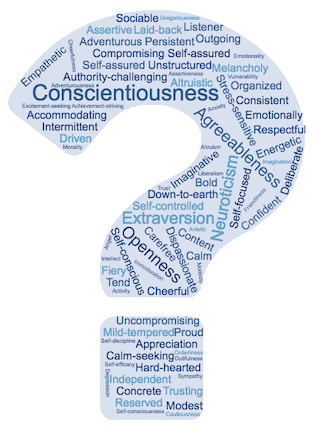Personality test
100% FreeBy the 123test team with research documentation and validation study available.
Updated on Apr 19, 2024.
Take this free Personality Test and find out more about who you are and your strengths. This is valuable information for choosing a career. This personality quiz measures the Big Five personality traits that were developed over three or four decades by several independent scientific researchers.

The Big Five Personality Test is by far the most scientifically validated and reliable psychological model to measure personality. This test is, together with the Myers Briggs personality test (MBTI test style), career test, DISC assessment and enneagram test, one of the most well known personality tests worldwide.
This free Big 5 personality test, aka OCEAN personality test, is fast and reliable. It is also used commercially by psychologists, career counselors, and other professionals that conduct personality assessment according to the Five Factor model.
In the free report you won't be pigeonholed into a single type, but you will learn how you score on the big five personality traits and learn what 30 subscales exist. Additionally you can even upgrade to an extended report if you like.
Instructions
- This Big 5 personality test contains 120 statements. There is no time limit. Most people take about 15 minutes - please allow yourself plenty of time.
- Please respond to all of the statements and answer in sequence.
- Double-check that you have made the right choice. If you need to change an answer, simply select the new response and the incorrect response will disappear.
- Try not to use the 'Neutral' option too often.
- Describe yourself as you generally are now, not as you wish to be in the future.
- Describe yourself, as you honestly see yourself, in relation to other people of the same sex and of roughly the same age. Your spontaneous answer is usually the most accurate.
For each statement choose the response that best represents your opinion:
| - - | Strongly Disagree | If you strongly disagree or if the statement is definitely false. |
| - | Disagree | If you disagree or if the statement is mostly false. |
| -/+ | Neutral | If you are neutral about the statement, if you cannot decide, or if the statement is about equally true and false. |
| + | Agree | If you agree or if the statement is mostly true. |
| + + | Strongly Agree | If you strongly agree or if the statement is definitely true. |
Frequently asked questions
What are the Big Five personality traits?
The term 'Big Five' refers to the five broad dimensions of personality that encompass most of the variation in human personality traits. These dimensions are often remembered using the acronym OCEAN. The Big Five Traits are:
- Openness to Experience: Reflects a person's openness to new experiences, creativity, and intellectual curiosity.
- Conscientiousness: Refers to a person's degree of organization, responsibility, and reliability.
- Extraversion: Indicates the level of sociability, assertiveness, and energy a person exhibits.
- Agreeableness: Relates to a person's tendency to be cooperative, empathetic, and considerate of others.
- Neuroticism (sometimes referred to as Emotional Stability or Natural Reactions): Reflects a person's emotional stability, anxiety, and moodiness.
What is the difference between Big Five traits, Five Factor model, and OCEAN model of personality?
The terms 'Big Five traits,' 'Five Factor model,' and 'OCEAN model of personality' are often used interchangeably to refer to the same framework for understanding human personality.
The Five Factor model can be seen as a more specific representation of the Big Five traits. It is a hierarchical model that organizes it into a more structured framework. Finally, the OCEAN model is only a helpful mnemonic to remember the traits.
What’s the difference between the MBTI and a Big Five personality test?
The MBTI is a typology, pigeonholing you into one of 16 types. It has four dimensions where you can only be on one end or the other, like a light switch. The big five dimensions are traits or scales, you can score a bit to one end, very much towards the other, or somewhere in the middle. Essentially anywhere on the scale. Because of this, answering slightly differently over time may lead to getting a different MBTI type for some people, but never to really different Big Five test results.
The MBTI is primarily based on the theory of Carl Jung whereas the Big Five model has empirical foundations. Therefore the latter is considered more valid. It is not advised to use the MBTI for selecting and recruiting, the Big Five model can be used for that and all other purposes too. Such as development, coaching and also clinical assessments.
Why are there five factors of personality?
Simply put, if you take all adjectives from a language that describe personalities and boil these down to cohesive groups, you end up with five broad factors. This is based on the so called lexical hypothesis. The idea being that all personality characteristics are represented in a language. You can also use a statistical approach through factor analysis. This results in the same five categories.
Is this truly a free personality test?
Yes, you can take the test for free, also without signing up, and get a free report. You have the option to subsequently buy a more extended report at a fee.
Is this a valid and reliable personality assessment?
Absolutely, there is no model other than the Big Five personality traits model that has been tested and proven to be so reliable and valid. The five factors have been shown to have actual biological substrates and underlying genetic factors, and are found across cultures and languages all over the world. There is even proof for the existence of some of these factors in animals (chimps, dolphins).